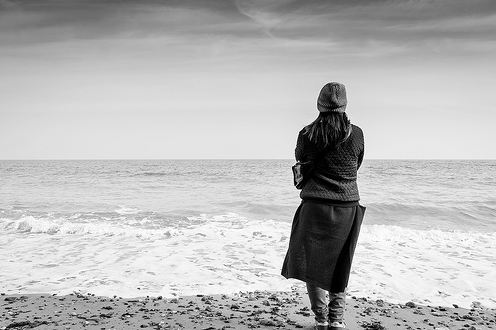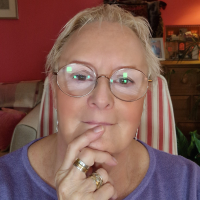I am standing on a clifftop high above the sea crashing and shattering on the rocks below.
I’m staring down with tears in my eyes and a pain in my chest that feels like it could tear me to pieces just like the waves are tearing at the rocks down there. Beside me is a pushchair, and in it is my three-year-old daughter.
She is screaming at the top of her voice, cheeks burning with rage and frustration, anger and hate in her eyes, and she is reaching to see if she can reach far enough to scratch and pummel me with her hands. If she could, she would bite and pull my hair. She hates this world for the disabilities she is struggling with.
Most of all she hates me, because even in my attempts to care for her—and oh, I love her, and she is part of me, in ways I can’t begin to convey—I can’t make it better.
And I am standing here, beside yet another of her relentless tantrums, about to break. In this moment, the sea and I are one. We both know this place, the wave that builds and then finds relief as it splinters itself into a thousand pieces on the rocks. And the emptiness as it falls away again, temporarily numb and free before yet another wave builds to a crescendo.
And in this moment, the wave that is building in me is one I would never have believed I could contemplate. It frightens me because it is so powerful that I realise that it could actually overpower me, knock my legs from under me, drown me:
It is the knowledge that I want to push my little girl over the edge before she pushes me over the edge.
The choice hung in the balance as time seemed to stand still, and Becky and I were held in a bubble of the most shatteringly painful ambivalence…love and hate…as I weighed the options up.
I remember how calming the momentary relief of visualizing it actually happening was. From a numb and dissociated place I saw the act and its aftermath in slow motion. I could just take off the brake on the pushchair, ease it right up to the cliff edge. It was crumbly, and the wind was strong. It could so easily have been the most appalling accident.
And my grief and horror wouldn’t be fake. I would be shocked and appalled, and I would grieve the loss of my child. But my grief would be way more complicated than anyone could possibly begin to imagine if they hadn’t known this same place.
The losses of the past three years had been huge and complicated: the loss of a worry-free pregnancy and lead up to the longed for arrival of a second baby; of a normal birth and the expected joyful visits from friends and relatives on the ward with other mothers; of the pleasure of holding your baby in your arms and the togetherness and bonding of breast-feeding; of the joy of watching your baby grow and develop and interact, the excitement of each new tiny milestone; of how this baby would develop a close relationship with her brother, who had been so anticipating having a brother or sister.
It’s a lonely thing, giving birth to a disabled child. Most people don’t know what to say, so they either pretend it hasn’t happened, or they tell you that everything will be all right, or they tell you she couldn’t have been born into a better family and is so lucky to have you.
And yet they can’t really know.
They can’t begin to imagine the terror, the sense of being trapped and wanting to run that exists alongside the most unbearable tender protective love. The fear for the future, the grief for the past, the enormous physical and emotional strain that the effort of day to day living entails.
What it’s like to wake in the morning.
Like I say, it’s complicated.
But I’m not sharing these things in order to produce a sensational story with a title to grab your interest so you’ll read on. I’m not a dramatic guts spiller. I’m a pretty contained and reflective sixty-one-year-old mother and grandmother who learned something about herself that day. And I think that moment of learning led me down the path to becoming the spiritually open and, I believe, compassionate psychotherapist I am today.
In that moment, all those years ago, I tasted the depth and fullness of what it is to be truly human.
And I realize, looking back down the years, that I needed to experience the fullness of our common humanity, and to learn to forgive and accept myself for it, in order to be able to be able to taste the wonder of that other amazing truth: our common divinity.
I’ve learned, time and time again, that it is only through allowing ourselves to touch and accept the fullness of what it is to be human—and we all have those opportunities in our lives—that we can move towards a place of self-acceptance and self-love.
There is no ‘perfect’ and there is no ‘right and wrong’; all there is, all there ever can be, is the best we could do at the time. How could there ever be anything else?
We did the best we could at the time.
And from that ‘best’ our path, as powerful spiritual Beings who have chosen to have a perfectly imperfect human experience, unfolds perfectly.
As does the path of all those who have chosen to come along to share that imperfectly perfect human experience with us and, in doing so, to have one of their very own.
Isn’t the aim to remember who we truly are? And isn’t the path one of finding our way back to unconditional love? To becoming once more the “compassionate witness” who is able to hold all in a loving embrace beyond judgement?
Is coming home to the love we all really are?
When we can get that, when we can feel how a realization of our Oneness can make our heart swell and beat in tune with the heart of the Universe, there is no longer shame, or pride, just gratitude for the complexity of perfection that is this adventure we call a life.
Needless to say, I didn’t take off that brake on the pushchair, and I didn’t push Becky over the edge and into the sea. And we have travelled a difficult, joyous, painful journey together.
But I could have done. And I needed to know and understand that in order to begin the journey towards forgiveness and compassion.
It’s because I know that I was capable of murder—not just of contemplating it but of committing it —that I can now hold that just as I am human so is everyone else equally human.
And more than that, I’ve realized over the years that there is nothing that I might find in another that I couldn’t find in myself.
If I looked hard enough.
I’ve realized that, however much we might be adamant that there are things we could never do, two things are immediately worth thinking about. One is, maybe we couldn’t because that isn’t the path we have chosen to experience in this lifetime, but who knows what we may choose in another? Or have chosen and known before? If we are Source energy eternally expanding through life here at the leading edge, then isn’t it always about the unconditional love which is always the inevitable consequence—if not directly and immediately apparent in us then in others who have been a witness?
And the other is, how can we ever be sure?
We all have hidden places inside us; there is nothing we can find in someone else that we couldn’t also find in ourselves if we were to look hard enough. It just takes courage and honesty to do the looking.
And if that is so, who am I to judge?
Ever?
Author: Janny Juddly
Editor: Renée Picard
Image: Mizrak/Flickr Creative Commons











Read 1 comment and reply